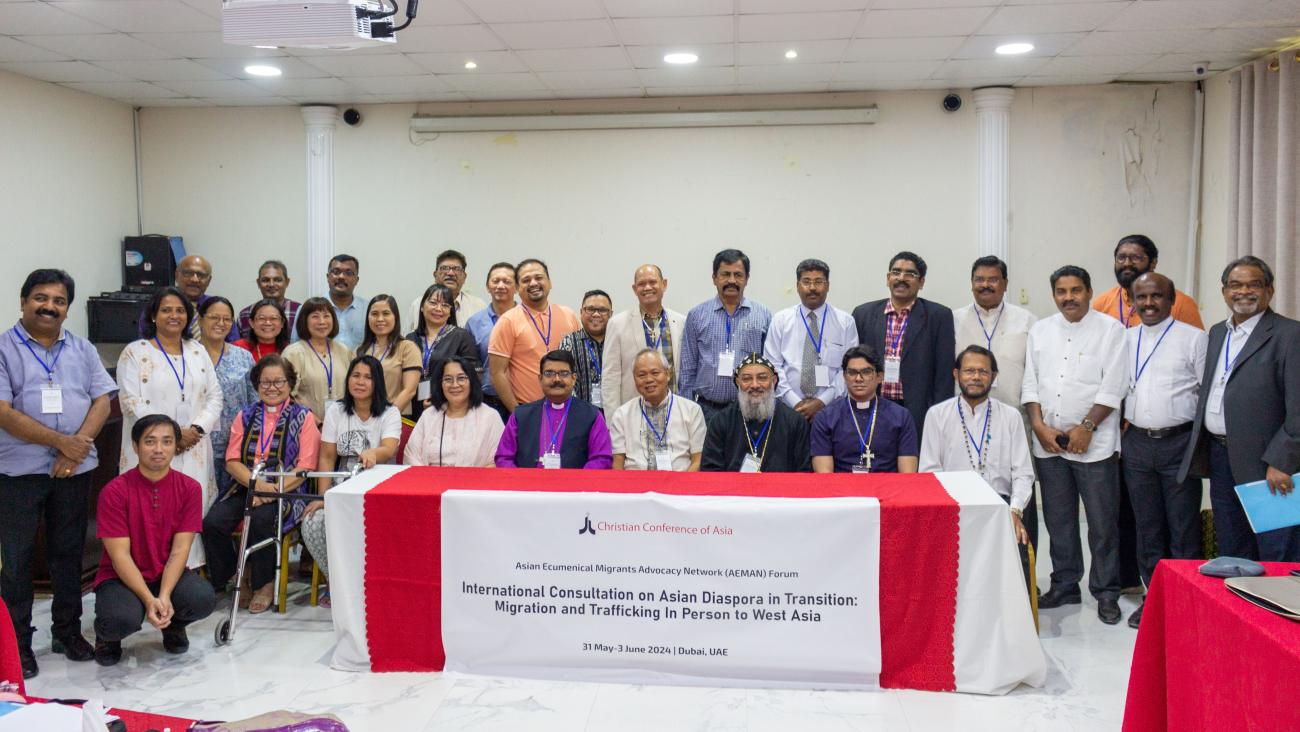Asian Ecumenical Migrants Advocacy Network Consultation strategises Churches’ engagement with issues of migration and trafficking in persons

Participants of International Consultation on Asian Diaspora in Transition: Migration and Human Trafficking to West Asia (Arabian Gulf) in Dubai
Dubai: A group of 40 delegates from CCA member churches in Asia, along with representatives from the Asian Diaspora congregations in the Arabian Gulf countries held an International Consultation on Asian Diaspora in Transition: Migration and Human Trafficking to West Asia (Arabian Gulf) in Dubai, the United Arab Emirates from May 31 to June 3, 2024.
The three-day consultation served as a platform for CCA member churches and councils from sending countries, as well as the diaspora churches in the Gulf countries (West Asia), to deliberate on actionable measures to address the challenges encountered by Asian migrant workers in the Arabian Gulf.
Bishop Reuel Norman Marigza, the CCA Moderator, in a Biblical-theological reflection, observed that “cultivating a compassionate and empathetic attitude towards migration is the necessary first step to developing a loving response to it.” He also emphasized that churches must fulfill their prophetic role and take a stand against issues that compromise people's dignity and rights.
Dr Ginu Zachariah, from the International Institute of Migration and Development, in a thematic address on 'Sending and Receiving Countries' Perspectives on Asian Migration to West Asia,' highlighted the need for sending and receiving countries to enact policies safeguarding the rights and welfare of migrant workers in GCC countries without jeopardizing their employment opportunities.
Furthermore, Janejinda Pawadee, a social worker from Thailand, and Rupa Pradhan Chetri, a psychologist and activist working for rescuing trafficked people in Nepal, addressed the issues of trafficking in persons in Southeast Asia and South Asia, respectively. They proposed several ways to prevent trafficking in persons, including increasing awareness, ensuring economic opportunities for vulnerable communities, promoting fair labor practices, and fortifying legal frameworks to facilitate safe and legal employment globally.
Metropolitan Dr Abraham Mar Seraphim from the Malankara Orthodox Syrian Church in India shared a Biblical-theological reflection on the Foundations of Pastoral Care for Migrant Workers. He emphasised that providing pastoral care for migrant workers challenges the Church to be an advocate of grace, justice, and inclusivity.
A panel discussion on the ‘Situation of Migrant Workers in the Arabian Gulf’ was facilitated by Mark Aquino from Migrante Middle East, Arul Raj from Dubai, Rev. Michael Aron Pasia from the Evangelical Methodist Church in Doha, Qatar, and Rev. Rufus Samieullah Khokhar from the Church of Pakistan, Dubai. Common issues shared by the panelists include the migrant worker's vulnerability to abuse and exploitation, economic insecurity, and lack of social and legal protection. Participants from the Arabian countries also presented experiences on the negative impact of the “Kafala” system, (Sponsorship), which keeps a migrant worker’s immigration status legally bound to an individual employer or sponsor (kafeel) for their contract period.
Practical approaches for pastoral accompaniment for families separated by distance from their working member and pastoral care for migrant workers from a sending country were presented by Rev. Marie Sol Villalon from the United Methodist Church in the Philippines. She emphasised the need to connect with family members through various social media on a constant basis to build relationship and provide emotional support.
A solidarity visit was made to a labour camp to understand the challenges faced by the migrant workers and to think of ways to tailor the ministry of the church so as to enhance the quality of its accompaniment.
A session dealing with ‘Preventing trafficking in person and exploitation’ was facilitated by Janejinda and Rupa Pradhan. They highlighted the need to strengthen legal measures and build awareness to provide correct information to families and communities.
Another important aspect of ‘resettlement and reintegration of migrants returned to home countries’ was discussed. The importance of church and communities towards removing stigma and labelling for those affected, especially those trafficked, as well as the need for engaging experienced trauma counsellors in the home countries to deal with the psychological impact of trafficking was also discussed.
The theme on migrant rights advocacy was presented by Tey Shwu Yuan from the Ministry for Migrants and Itinerants (MMI-Malaysia) and Mark Aquino from Migrante-Middle East. They mentioned the need for an effective advocacy tool towards migration and suggested churches as platform for awareness and education.
The participants engaged in a planning session to explore feasible strategies for churches to promote the dignity, rights, and welfare of migrants.
Recommendations to churches include raising awareness about migrants’ issues, conducting Migrant Sunday celebrations, providing counseling, pastoral care, and legal services to the migrants, and strengthening fellowship and coordination among CCA member churches in the Arabian Gulf countries as well as to collaborate on addressing migrant concerns and advocating for their dignity and rights.










